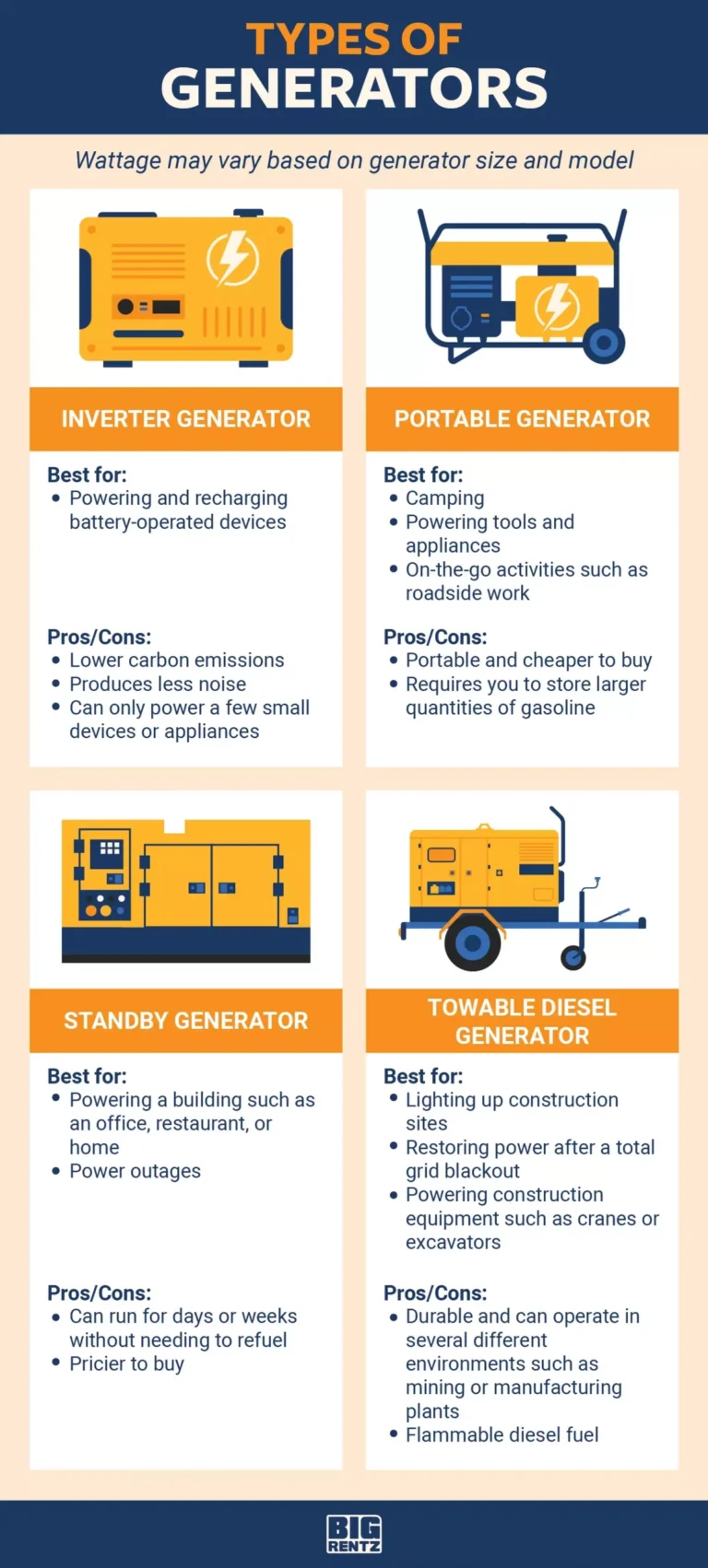Yes, an inverter generator can power a house. Its suitability depends on the generator’s wattage and your household’s energy needs.
An inverter generator is a reliable source of backup power for homes during outages. These generators produce clean, stable electricity, making them safe for sensitive electronics. They are quieter and more fuel-efficient compared to traditional generators. To determine if an inverter generator can power your house, calculate your total power requirements.
Essential appliances like refrigerators, lights, and heating systems will need more power. Choose a generator with adequate wattage to match your needs. For larger homes, you might need a higher-capacity model or multiple units. Proper planning ensures uninterrupted power and peace of mind during emergencies.

Credit: www.consumerreports.org
Introduction To Inverter Generators
Inverter generators are a modern solution for reliable power. They offer a more efficient and quieter alternative to traditional generators. Inverter generators are compact and easy to use. They provide clean and stable power for sensitive electronics. Understanding how these generators work is crucial.
What Is An Inverter Generator?
An inverter generator produces AC power like a regular generator. It then converts this AC power to DC power. Finally, it inverts it back to AC power. This process ensures a stable and clean power supply.
- Compact size: Easy to transport and store.
- Clean energy: Safe for sensitive electronics.
- Fuel efficiency: Uses less fuel compared to traditional generators.
Key Features
Inverter generators come with several unique features:
| Feature | Description |
|---|---|
| Portability | Lightweight and easy to move around. |
| Noise Reduction | Operates quietly, ideal for residential areas. |
| Parallel Capability | Connect two units for double the power. |
| Eco-mode | Adjusts the engine speed to match the load. |

Credit: www.reddit.com
Power Needs Of A House
Understanding the power needs of a house is crucial. This helps determine if an inverter generator can power it. Houses have various appliances and devices that require electricity. Knowing how much power each device needs helps in choosing the right generator.
Essential Appliances
Some appliances are essential for daily life. These include:
- Refrigerator: Keeps food fresh and safe.
- Lights: Provide illumination during the night.
- Heating or Cooling System: Maintains comfortable temperatures.
- Water Heater: Supplies hot water for showers and cleaning.
- Cooking Appliances: Such as stoves and microwaves.
Each of these appliances has specific power requirements. It’s important to know these needs for accurate power calculation.
Total Wattage Calculation
Calculate the total wattage needed to power the house. Use the following table to estimate the wattage of common appliances:
| Appliance | Wattage |
|---|---|
| Refrigerator | 600W |
| Lights (total) | 300W |
| Heating/Cooling System | 1500W |
| Water Heater | 4500W |
| Cooking Appliances | 1000W |
Add the wattage of all essential appliances. This gives the total power requirement. Ensure the inverter generator can handle this total wattage.
For example, if your total wattage is 7900W, choose a generator with at least this capacity. This ensures all essential appliances run smoothly.
| Read more about common How To Tell If Power Converter Is Bad in Camper
Inverter Generators Vs. Conventional Generators
Choosing between an inverter generator and a conventional generator can be challenging. Both have unique features and benefits. This section highlights key differences to help you decide.
Efficiency And Fuel Consumption
Inverter generators are more efficient. They adjust engine speed based on power needs. This feature reduces fuel consumption.
In contrast, conventional generators run at a constant speed. This leads to higher fuel use. The table below compares fuel consumption:
| Generator Type | Fuel Efficiency | Fuel Consumption |
|---|---|---|
| Inverter Generator | High | Low |
| Conventional Generator | Low | High |
Noise Levels
Inverter generators are quieter. They produce noise levels around 50-60 decibels. This is like a normal conversation.
Conventional generators are much louder. Noise levels can reach up to 90 decibels. This is comparable to a lawnmower.
To summarize:
- Inverter Generators: Quiet (50-60 dB)
- Conventional Generators: Loud (up to 90 dB)
Advantages Of Inverter Generators
Inverter generators offer several benefits for powering a house. They are popular for their portability and cleaner power output. These features make them a great choice for homeowners.
Portability
Inverter generators are lightweight and compact. You can easily move them around. This makes them perfect for outdoor activities and emergencies. Unlike traditional generators, inverter models are user-friendly. They often come with wheels and handles. This design ensures easy transportation and setup. You can store them in small spaces. This is ideal for homes with limited storage.
Cleaner Power Output
Inverter generators provide a stable power output. They produce less harmonic distortion. This is crucial for sensitive electronics. Items like laptops and smartphones need clean power. Traditional generators can damage these devices. Inverter generators adjust the engine speed. This matches the power demand. It results in more efficient fuel use. The power they produce is similar to the one from the grid. This ensures the safety of your home appliances.
Limitations Of Inverter Generators
Inverter generators offer many advantages, but they also have limitations. Understanding these limitations helps you make an informed decision.
Power Output Limitations
Inverter generators typically have lower power output compared to traditional generators. They are designed for small appliances and not whole-house power. Most inverter generators range from 1000 to 4000 watts. This is enough for basic needs but not for high-demand appliances like central air conditioning or electric heaters.
If you want to run multiple large appliances, an inverter generator may not suffice. You may need a larger, traditional generator or multiple inverter generators.
Higher Initial Cost
Inverter generators generally cost more than traditional generators of similar power. The advanced technology and noise-reduction features add to the cost. Though they are more fuel-efficient and quieter, the initial investment can be high.
For a budget-conscious buyer, the higher initial cost might be a drawback. You may need to weigh the long-term savings in fuel against the upfront expense.
| Type of Generator | Average Cost |
|---|---|
| Inverter Generator | $500 – $3000 |
| Traditional Generator | $300 – $2000 |

Credit: www.youtube.com
Sizing An Inverter Generator For Your Home
Choosing the right inverter generator is crucial for powering your house. The process involves understanding your power needs and selecting a suitable model. This ensures uninterrupted power during outages.
Determining Your Power Needs
Start by listing all essential appliances and devices. Calculate their total wattage. Include items like refrigerators, lights, and medical equipment.
| Appliance | Wattage |
|---|---|
| Refrigerator | 700W |
| Television | 150W |
| Lights | 300W |
| Microwave | 1000W |
Sum the wattage to find the total power requirement. This helps in sizing the generator accurately.
Choosing The Right Model
Look for a generator with a wattage slightly higher than your total need. This ensures you have extra capacity for unexpected power surges.
- Portable models: Ideal for smaller homes or limited power needs.
- Standby models: Suitable for larger homes with higher power demands.
Consider features like fuel efficiency, noise level, and portability. These factors enhance user experience and convenience.
Review user ratings and expert reviews. This helps in making an informed decision.
By following these steps, you can select the best inverter generator for your home. It ensures reliable power during outages.
Installation And Safety Tips
Ensuring the proper installation and safety of your inverter generator is crucial. This guide will help you set up correctly and keep your home safe. Follow these tips for a seamless experience.
Proper Setup
To begin, select an appropriate location for the generator. Place it outdoors, at least 20 feet away from windows and doors.
- Ensure the area is dry and well-ventilated.
- Use a heavy-duty extension cord for connections.
- Secure the generator on a flat, stable surface.
Next, connect the inverter generator to your home’s electrical system. Use a transfer switch. This switch helps to avoid back-feeding, which can be dangerous.
| Step | Description |
|---|---|
| 1 | Turn off the main power supply. |
| 2 | Connect the generator to the transfer switch. |
| 3 | Switch the power source to the generator. |
Maintenance And Safety Precautions
Regular maintenance is key to ensuring your generator runs smoothly. Check the oil levels every time before use. Change the oil after every 50 hours of operation.
- Keep the generator clean and free from debris.
- Inspect the fuel system for leaks and wear.
- Test the generator monthly to ensure it is in working order.
Safety should always be a top priority. Never operate the generator indoors. Install a carbon monoxide detector in your home. This can alert you to harmful fumes.
Follow these tips to keep your home powered safely with an inverter generator.
Real-life Examples And Case Studies
Can an inverter generator power a house? Many people ask this question. Let’s look at real-life examples and case studies. These stories show how inverter generators work in homes. They highlight the benefits and practical uses.
Small Homes And Apartments
Small homes and apartments can benefit from inverter generators. Jane lives in a tiny home. She uses an inverter generator for her power needs. Her generator runs her lights, fridge, and TV. It is quiet and efficient. She never worries about power cuts.
Another example is Mark. He lives in a small apartment. He uses an inverter generator during power outages. His generator keeps his essential devices running. This includes his laptop and phone charger. Mark loves the peace of mind it provides.
Emergency Backup Scenarios
In emergencies, inverter generators are lifesavers. During a storm, the Smith family lost power. Their inverter generator kept their home running. They used it for lights, heating, and cooking. The family stayed safe and comfortable.
Alice faced a similar situation. Her town experienced a blackout. Alice had an inverter generator ready. It powered her essential appliances. Her generator ran her medical equipment and fridge. Alice was very thankful for her preparedness.
| Case Study | Scenario | Devices Powered |
|---|---|---|
| Jane | Small Home | Lights, Fridge, TV |
| Mark | Apartment | Laptop, Phone Charger |
| Smith Family | Storm Outage | Lights, Heating, Cooking |
| Alice | Town Blackout | Medical Equipment, Fridge |
Frequently Asked Questions
Can An Inverter Generator Run A Whole House?
Yes, an inverter generator can power a whole house. It depends on the generator’s wattage. Ensure the generator’s capacity matches your home’s power needs.
What Size Inverter Generator Do I Need For My House?
The size of the inverter generator depends on your home’s power consumption. Calculate total wattage of essential appliances. Choose a generator with higher wattage than total consumption.
Are Inverter Generators Suitable For Home Use?
Yes, inverter generators are suitable for home use. They are quiet, fuel-efficient, and provide stable power. Ideal for sensitive electronics.
How Long Can An Inverter Generator Power A House?
The duration depends on the fuel tank size and load. Most inverter generators can run for 8-12 hours on a full tank.
Conclusion
An inverter generator can effectively power a house during outages. It offers reliable, clean energy for essential appliances. Choosing the right size and model ensures optimal performance. Always consult a professional for proper setup and safety. Investing in an inverter generator provides peace of mind and energy security for your home.

